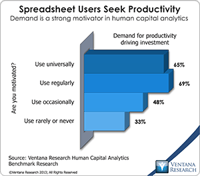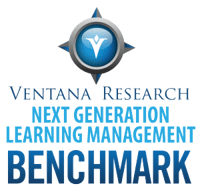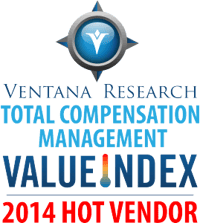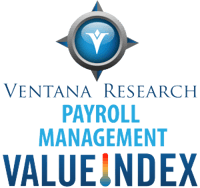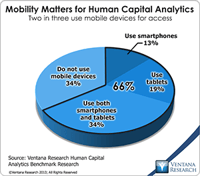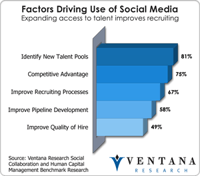I am happy to share insights gleaned from our latest Value Index research, an assessment of how well vendors’ offerings meet buyers’ requirements. The Ventana Research Value Index: Workforce Management 2022 is the distillation of a year of market and product research by Ventana Research. Drawing on our Benchmark Research, we apply a structured methodology built on evaluation categories that reflect the real-world criteria incorporated in a request for proposal to workforce management vendors...
Read More
Topics:
Human Capital Management,
Learning Management,
Talent Management,
Workforce Management,
Payroll Management,
Total Compensation Management,
employee experience
Workforce management processes and activities, a major focus of investment and optimization efforts for decades, have undergone a huge transformation in recent years. In our view, this is mostly a function of two significant trends: the explosion of technology innovation associated with the use of artificial intelligence, machine learning and embedded analytics in many areas of a business including a range of human capital management processes and operations; and a major reframing of the...
Read More
Topics:
Human Capital Management,
Learning Management,
Talent Management,
Workforce Management,
Payroll Management,
Total Compensation Management,
employee experience
Enterprise resource planning (ERP) is a software category that includes an array of business applications that includes human resources and finance. Workday is a vendor at the center of a new generation of ERP. My colleague Robert Kugel recently covered that company’s advances in finance using cloud computing to operate its platform. And I recently attended Workday’s technology analyst summit, where I got a deeper view of the technology under its applications and its efforts to perfect its...
Read More
Topics:
HCM,
Human Capital,
Human Capital Management,
Uncategorized,
HR,
Talent Management
Managing investments in people and their performance is critical to every organization. It also is complicated. To support the various aspects of human capital management (HCM), organizations often use a variety of technology including systems for human resource management, talent management, workforce management and payroll management. Often these separate systems use their own information and are not well connected to each other. Today they are deployed both on-premises and in cloud computing...
Read More
Topics:
HCM,
Human Capital,
Human Capital Management,
Operational Performance Management (OPM),
Business Performance Management (BPM),
Customer Performance Management (CPM),
Financial Performance Management (FPM),
HRMS,
Supply Chain Performance Management (SCPM),
Talent Management,
Workforce Management
As organizations look to improve the competency and skills of their workers, learning management system (LMS) technology can help improve their efforts. Our latest benchmark research innext-generation learning management systems finds a range of progress in this regard. Our Performance Index analysis places organizations almost evenly between the two lowest (51%) and the two highest (49%) of four levels of performance. The results differ by size of company as measured by number of employees....
Read More
Topics:
HCM,
Human Capital,
Human Capital Management,
LMS,
Operational Performance Management (OPM),
Business Performance Management (BPM),
HR,
Talent Management
It is more important than ever for businesses to attract and retain the best talent, and managing compensation effectively is an essential tool for doing so. Obviously companies must pay well to compete, but managing salary, merit pay, variable pay and incentives for employees, tracking their hiring anniversaries and conducting accurate performance appraisals make total compensation management a complex process. All of this must be managed within budget and policy guidelines. As organizations...
Read More
Topics:
HCM,
Human Capital Management,
Operational Performance Management (OPM),
Sales Compensation,
Business Performance Management (BPM),
CFO,
Compensation,
Customer Performance Management (CPM),
finance,
Financial Performance Management (FPM),
HR,
Sales Performance Management (SPM),
Talent Management,
TCM,
Workforce Performance Management (WPM)
To help companies improve the efficiency and effectiveness of their payroll management processes, we have assembled our 2015 Value Index for Payroll Management. It evaluates vendors of payroll management software to provide a guide for selecting the right application to suit specific needs. The executive summary is available for download, and this analysis provides a snapshot of the findings. Ventana Research defines payroll management as all activities associated with paying employees...
Read More
Topics:
Human Capital Management,
Office of Finance,
Uncategorized,
HR,
HRMS,
Talent Management
In the near future, technology will be something we wear or attach comfortably to our bodies. Wearable computers have been evolving for some time, and while that might seem futuristic to the uninformed, in the technology industry it is rapidly becoming real. This trend is important for businesses to note, as our business technology innovation research shows that it is very important to more than half (56%) of organizations to find methods to use technology innovation to support both business...
Read More
Topics:
Big Data,
Social Media,
HCM,
Human Capital Management,
Operational Performance Management (OPM),
Wearable Computing,
Business Analytics,
Business Collaboration,
Business Intelligence,
Cloud Computing,
Operational Intelligence,
Business Performance Management (BPM),
Customer Performance Management (CPM),
Information Applications (IA),
Information Management (IM),
Sales Performance Management (SPM),
Supply Chain Performance Management (SCPM),
Talent Management,
Workforce Performance Management (WPM)
At Oracle’s first-ever HCM World conference, the technology company demonstrated its commitment to human resources customers, explaining its strategy for Modern HR in the Cloud, which is focused on meeting the needs of employees in a large, dispersed workforce. The conference was insightful both intellectually and practically in its discussions of how workforces are changing. Oracle also showed its commitment by having both President Mark Hurd and CEO Larry Ellison present keynotes. This was...
Read More
Topics:
Big Data,
Social Media,
Human Capital Analytics,
Human Capital Management,
Operational Performance Management (OPM),
Recruiting,
Business Analytics,
Business Collaboration,
Business Intelligence,
Cloud Computing,
Oracle,
Business Performance Management (BPM),
Customer Performance Management (CPM),
Financial Performance Management (FPM),
HR,
Information Applications (IA),
Sales Performance Management (SPM),
Supply Chain Performance Management (SCPM),
Talent Management,
Workforce Management,
Workforce Performance Management (WPM)
During its annual industry analyst summit this week, human capital management software vendor SumTotal Systems introduced new heads of finance, marketing and sales, and talked about expanding operations in Europe and Asia-Pacific – all part of a business growth strategy that I am sure the company’s private equity owner is expecting. While I wrote about the company earlier this year, SumTotal now says it has signed up 85 new customers so far in 2012 for its human capital management suite, and...
Read More
Topics:
Social Media,
Human Capital Management,
Mobile Technology,
Recruiting,
Social Collaboration,
Business Analytics,
Business Collaboration,
Cloud Computing,
Business Performance Management (BPM),
Talent Management,
Workforce Management,
Workforce Performance Management (WPM)



